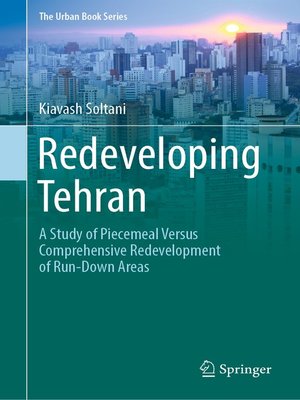Redeveloping Tehran
ebook ∣ A Study of Piecemeal Versus Comprehensive Redevelopment of Run-Down Areas · Urban Book
By Kiavash Soltani

Sign up to save your library
With an OverDrive account, you can save your favorite libraries for at-a-glance information about availability. Find out more about OverDrive accounts.
Find this title in Libby, the library reading app by OverDrive.



Search for a digital library with this title
Title found at these libraries:
| Library Name | Distance |
|---|---|
| Loading... |
This book compares two urban regeneration models, namely piecemeal and comprehensive redevelopments. Tehran, like many cities in the developing world, on the one hand faces extensive deterioration in its inner-city neighbourhoods and on the other hand, faces rapid population growth. Urban regeneration is adapted as a policy that not only accommodates urban growth within the city boundaries, but also tackles the deterioration problems. This book tries to understand how these two redevelopment models operate in run-down neighbourhoods of Tehran, with a specific focus on developers' behaviour regarding these two models.
Two neighbourhoods that have undergone redevelopments in Tehran, one piecemeal and one comprehensive, are chosen as case studies. Utilising institutional analysis as a qualitative methodological approach, this book improves our understanding of the process of built environment production, as well as the role of developers and state in the development process.The book demonstrates that the development decision-making cannot be solely understood as the result of economic rationality, as it occurs within institutional contexts structured by dynamic needs and concerns of actors. In advancing institutional analysis, the research demonstrates the different approaches taken by developers, development organisations and planners as they engaged differently with the wider structures set by the government through different policies.
Two neighbourhoods that have undergone redevelopments in Tehran, one piecemeal and one comprehensive, are chosen as case studies. Utilising institutional analysis as a qualitative methodological approach, this book improves our understanding of the process of built environment production, as well as the role of developers and state in the development process.The book demonstrates that the development decision-making cannot be solely understood as the result of economic rationality, as it occurs within institutional contexts structured by dynamic needs and concerns of actors. In advancing institutional analysis, the research demonstrates the different approaches taken by developers, development organisations and planners as they engaged differently with the wider structures set by the government through different policies.







